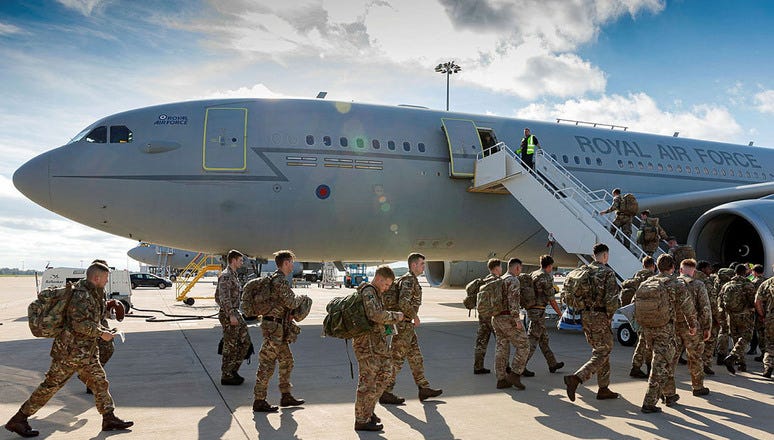Britain Reclaims Its European Flank: London Draws the Line on Kosovo
London fused posture with principle: urging Kosovo’s recognition at the UN and extending NATO backing until 2028, Britain declared deterrence its doctrine and Russia-backed ambiguity its enemy.
London was the right city to say the quiet part out loud. On the eve of the Berlin Process summit, Britain fused principle to posture, at the UN Security Council in New York it urged the hold-outs1 to “join the majority and recognise Kosovo’s independence”, and in London it renewed its military backstop, extending UK support to NATO’s KFOR mission2 “until at least December 2028”. Those two moves, taken together, cut through a decade of hedging: the Western Balkans are in the crosshairs; Serbia is the proximate destabiliser acting in concert with the Kremlin; Kosovo is where the West must hold the line; and Britain has decided to stay on the line, not admire it from afar.
President Aleksandar Vucic did not attend the London leaders’ summit. Serbia was represented at head-of-government level by Prime Minister Duro Macut, in line with the UK Chair’s Conclusions that gathered Western Balkan heads of government. Belgrade’s choice to send the prime minister rather than the president still signals calculation: it keeps Serbia in the Berlin Process room while insulating Vucic from a forum that, this week, foregrounded Kosovo’s sovereignty and the UK’s extended KFOR backstop—positions that clash with his domestic posture. In practical terms, Serbia remains formally engaged, but the optics underscore Belgrade’s hedging between participation and defiance.
That choice did not drop from a clear blue sky. It followed two hard lessons. The first came on 24 September 2023 at Banjska, when a well-armed Serb unit killed Kosovo Police Sergeant Afrim Bunjaku and fought an all-day engagement around a monastery in the north3. Within days, two hundred British soldiers flew in at NATO’s request to stiffen the mission4. Reinforcements are not rhetoric5, they are a recognition that the Kremlin’s preferred instruments in the region are deniable proxies, disinformation, energy leverage and perpetual “talks” that never culminate. The second lesson arrived by accumulation, each time Serbia escalated and evaded accountability, most glaringly its refusal to extradite the man who publicly took responsibility for Banjska, the cost of inaction rose. London has now drawn the obvious conclusion, deterrence is cheaper than a crisis.

Before the London summit, Pristina’s message to Britain was unambiguous and, crucially translated.
“Kosovo’s partnership with the United Kingdom is built on pillars such as cooperation in defence and security, economic development and diplomacy,” the Prime Minister’s office said, adding that “this partnership strengthens our bilateral ties, fosters knowledge exchange and contributes to peace, stability and shared prosperity.”
In his policy remarks at RUSI, Albin Kurti described the threat set with clarity, Kosovo views the United Kingdom as “key” to countering Russia’s hybrid war in the Western Balkans, “including disinformation and illicit finance” and, in the same breath, he linked restraint to resilience, quadrupled defence spending, modernisation of the Kosovo Security Force, and economic measures designed to anchor people and capital to the state rather than to contraband and fear. Those lines matter because they bridge two worlds British policy too often keeps separate, the troop rotation and the customs reform, the ISR drone and the diaspora-credit window, the quick reaction unit and the independent newsroom. In the Balkans, as in Ukraine, the adversary attacks across all of them at once.
Britain’s own language matched the moment. At the Security Council, UK Minister-Counsellor Jennifer MacNaughtan called recognition of Kosovo “essential for long-term stability and for unlocking Kosovo’s full potential”, welcomed the restoration of representative local government in the north, and called for the second year running for accountability for Banjska, “including Milan Radoicic”. In London, Downing Street coupled the KFOR extension to a wider Berlin Process agenda, migration management, rule of law, economic connectivity, precisely because Moscow’s Balkan playbook blends pressure across borders with corrosion inside institutions. You cannot police the Channel properly while leaving a permissive flank on the Adriatic, you cannot preach “European values” while tolerating proxy violence against a European democracy.
Set against this, Belgrade’s strategy has ceased to be “balancing” and now looks exactly like what it is, alignment with Russia’s power methods dressed in European vocabulary6. The pattern is too consistent to be accidental. Serbia signed a foreign-policy “coordination” agreement with Moscow7 months into the full-scale war, kept Gazprom’s energy umbilical, allowed a Kremlin-friendly “humanitarian centre” in Niš to sit in legally ambiguous comfort, mixed Chinese air-defence systems and Russian Pantsirs with a high-profile Rafale purchase to cultivate leverage in Paris while advertising interoperability to Moscow and Beijing, and practised a rhetoric of permanent grievance that recycles the Kremlin’s false equivalences. When Aleksandar Vucic declares8 “everyone is preparing for war” and insists9 Kosovo is “an inalienable part of Serbia”, he is not improvising, he is mainstreaming the logic that gave the world Crimea and Donbas, change facts on the ground, launder them through a fog of lawfare and media warfare, then demand Western “pragmatism”. His June 2025 visit to Odesa10, pitched as solidarity with Ukraine, fit the same pattern, a Potemkin gesture meant to launder an image while Serbia blocks sanctions on Russia, blocks Kosovo’s international consolidation, and courts the very security services Kyiv is fighting. The tactic is not diplomacy, it is infiltration by narrative.



